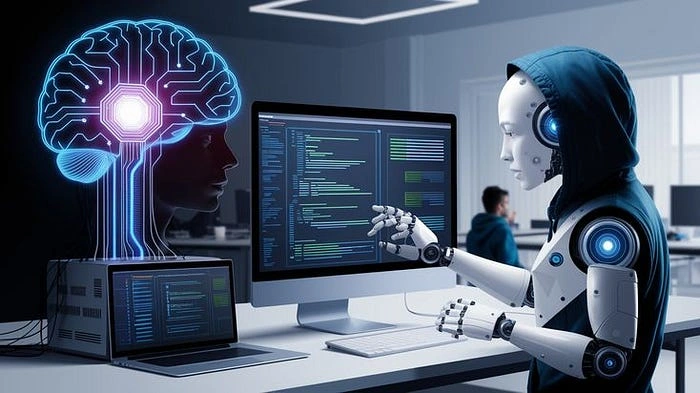The Future of AI-Powered Productivity Tools in 2025
Like this project
Posted Apr 4, 2025
Times keep changing, and so do systems. Productivity and system optimization previously required a great deal of human labor to be efficient, but today, with a…

The Future of AI-Powered Productivity Tools in 2025
5 min read·
Mar 16, 2025

Times keep changing, and so do systems. Productivity and system optimization previously required a great deal of human labor to be efficient, but today, with artificial intelligence's aid, a system can be automated with a single click.
AI-powered solutions have improved workflow, sped up decision-making, and saved time, making them an indispensable component of individuals, startups, and even daily life. Since there is an artificial intelligence tool that can act as your right-hand man and make everything quick and simple, what good is it to continue using an antiquated, traditional system that requires you to accomplish everything by hand? None.
The benefits of AI in productivity are incalculable, but despite its ongoing revolution and growing significance in modern life, it has generated a great deal of debate among many individuals. Is AI going to change the way we work, or will human innovation always be valuable? This article will provide an answer to this question as well as a discussion of the 2025 prospects for productivity tools driven by AI.
What are AI-powered productivity tools?
Every time you use ChatGPT, Notion AI, Gemini AI, or Jasper AI and the like to solve problems or get an idea, bear in mind that you are using an AI-powered productivity tool. An artificial intelligence (AI) productivity tool is a piece of software that solves problems, helps businesses work more efficiently, optimizes workflow, eliminates guesswork, and provides you with immediate aid rather than requiring you to go through the troublesome manual path. Automation is simple, decision-making is quicker, and productivity is increased with AI-powered solutions.
The capacity of AI-powered productivity tools to automate, make intelligent recommendations, personalize responses, analyze data, and even react to voice commands are some of its primary capabilities that make them more like a person’s best friend these days.
AI Predictions in Productivity in 2025
AI technologies are expected to revolutionize productivity in 2025 by providing solutions that combine automation, innovation, and efficiency in a variety of industries. It is safe to conclude that tools like Notion AI have already started changing the game in terms of smooth productivity in 2025. Notion AI, which enhances note-taking and project management by offering real-time suggestions and automating workflow organization, boosts productivity by up to 80%. This is just one of the reasons why AI-powered products remain the greatest option for productivity in 2025.
Platforms like Slack and Zoom are incorporating AI to improve communication and meeting productivity, while tools like Copy.ai and Jasper AI are developing to assist marketers and content producers in creating captivating copy with little effort.
Microsoft’s Copilot is another exceptional product that significantly cuts down on the amount of time spent on repetitive tasks by integrating smoothly with the Office suite to write code, draft documents, and even make presentations. The top AI productivity solutions for 2025 are made to improve overall efficiency, task management, and workflow automation.
Potential Challenges of AI-powered productivity tools in 2025
In startups, data management is a crucial area of concern. Businesses must strike a balance between using enormous volumes of data and maintaining legal compliance. Although technology is here to stay, there are drawbacks to its uses, which necessitate human intervention and innovative problem-solving. As AI systems increasingly make decisions that impact individuals’ lives, there is more potential for misuse, bias, and data breaches. Let's take a look at some potential challenges of AI-powered productivity tools.
Privacy & Data Security Risks
AI-powered productivity tools have a lot of benefits, but they have also brought up serious security and privacy issues. Data protection concerns become increasingly complex as AI develops, encompassing technological, ethical, and social aspects.
There are serious concerns about ethical AI practices, especially about the management of sensitive and personal data, given the quick adoption of modern AI technology across a range of corporate domains, from analytics to accountancy. Since businesses must strike a balance between exploiting enormous volumes of data and maintaining regulatory compliance, data management continues to be a crucial area of concern.
Accountability issues
It is challenging to assign blame for errors or injury caused by AI systems to either the AI itself, its creators, or its operators. This ambiguity makes it difficult to enforce accountability and confuses ethical and legal frameworks.
Surveillance and monitoring
AI is a potent tool for monitoring and surveillance because of its real-time data analysis capabilities. Although there are valid applications for this, such as ensuring public safety, there are also worries about abuse.
Intellectual property rights
AI raises difficult questions about the ownership of intellectual property. For example, it’s still unclear who owns the rights to creative works of art, music, or innovations produced by AI. The AI’s creators, its users, or nobody.
The Human-AI Collaboration in 2025
Now, even though AI seems like a savior, it’s crucial to know how to use it creatively. This is what sets you apart from the typical user of AI-powered productivity products. AI-powered productivity tools make life easier for individuals, startups, and organizations, but relying just on AI eliminates the originality and authenticity of any effort.
Instead of relying entirely on AI, the ideal way to employ AI-powered products in 2025 is to work together with it. Since nearly everyone is using AI to solve problems, the only way to stand out when using these AI-powered technologies is to work creatively with AI, which greatly facilitates the brainstorming process. After that, you may modify and customize those ideas to meet your needs.
When utilizing AI-powered productivity solutions, it’s important to keep in mind that human creativity, critical thinking, and decision-making are essential components and shouldn’t be neglected in favor of having AI handle everything.
Conclusion
Although AI-powered tools are a great boon, their uniqueness will always be in their ability to supplement human creativity rather than replace it. As technology advances, we should undoubtedly anticipate more automations and improved integrations when it comes to using AI-powered tools.






